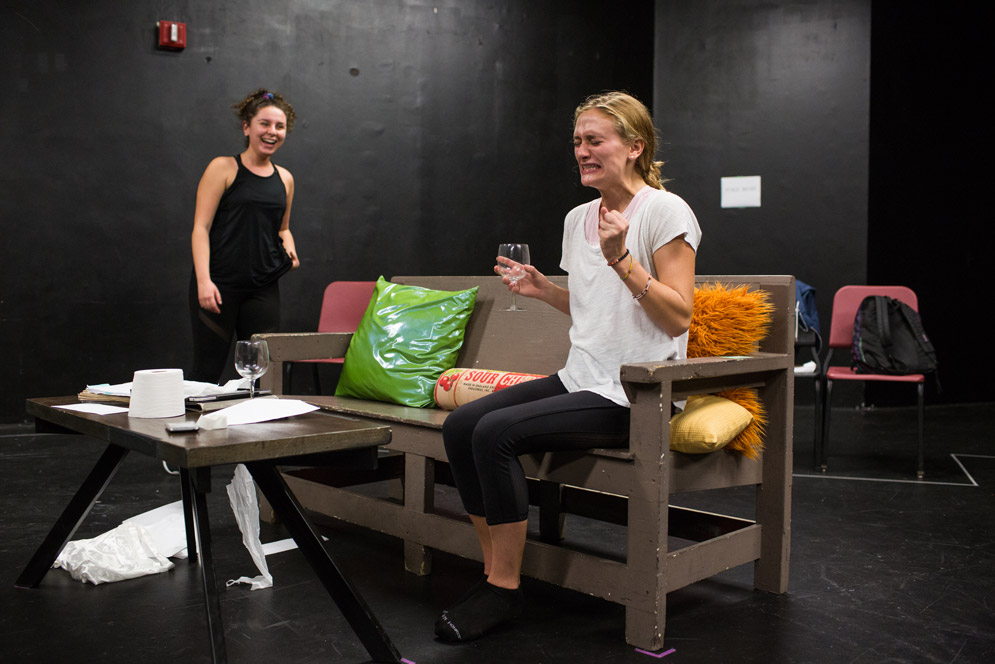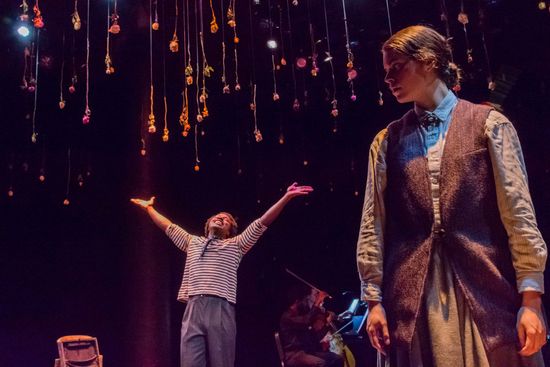CFA’s Annual Fringe Festival Offers Sex, Picasso, and Verdi
Two operas join comedy by recent BU alum

Unmentionables probes the not-so-private lives of roommates Claudia (left), played by Gina Fonseca (CFA’20), and Shannon, played by Caroline Quigley (CFA’20). Photos by Jake Belcher
TAKEAWAYS:
- College of Fine Arts 22nd annual Fringe Festival runs October 12 to 28
- Opens tonight with opera After Life, composed by GRS alum
- Features Unmentionables, a comedy written by Molly Greville (CFA’18)
The fringiest production in this year’s College of Fine Arts Fringe Festival is a play that defies its own title: Unmentionables.
The comedy, written by Molly Greville (CFA’18), offers a pungent look at today’s notions of sex and intimacy via conversations between a pair of 20-something roommates, one of whom pays her rent by selling her used underwear online for $30, a side hustle with unforeseen complications.
The play’s title refers not just to underwear, but to truths that are not easy to talk about. And while it doesn’t mention Brett Kavanaugh’s Supreme Court confirmation hearings or other recent sex-and-power scandals, those headlines hover over the play.
“The play was a different play after the Harvey Weinstein accusations came out. Same plot line, but the way the characters react is more intense,” Greville says.
“Fringe” means new or edgy work, and this year’s festival also includes two operas alongside Unmentionables. The first, After Life, about Pablo Picasso and Gertrude Stein, composed by Tom Cipullo (GRS’85), with a libretto by David Mason, begins tonight and plays through Sunday at CFA’s Studio ONE. Unmentionables runs October 25 to 28, also at Studio ONE. Along with these two contemporary pieces is a production of one of the most famous operas ever written, Giuseppe Verdi’s La Traviata, which will be performed with some unusual casting October 26 and 27 at the Tsai Performance Center.
But it’s Greville’s Unmentionables with its exploration of love, sex, and making a living that’s likely to resonate most with students.
In the play, Shannon, played by Caroline Quigley (CFA’20), is a low-level editor with an upper-middle-class background reluctantly proofreading porn romance novels in her starter job at a publishing house. Her roommate, Claudia, played by Gina Fonseca (CFA’20), grew up poor and is dating a sugar daddy to supplement the underwear business, something she doesn’t see anything wrong with. In fact, she thinks it’s time for lonely Shannon to get back on Tinder.
“I flirt with people always,” Shannon insists.
“Oh yes! You and the Grubhub guy would make a lovely couple,” Claudia snaps back.
Things get complicated when Shannon finally brings home a guy, Tom, performed by Curtis Chase Schalchlin (CFA’19). And when Shannon’s dad turns up (he’s played by Zachary Zamsky (CFA’19)), he isn’t happy about any of this.
Since arriving at BU, Greville says, she has often written about women’s sexuality and female friendships. But Unmentionables, a BU New Play Initiative production, also examines class and privilege, and delivers empathy in unexpected ways.

Greville wrote the play as an exercise for a playwriting class taught by Kirsten Greenidge, a CFA assistant professor of playwriting and theater arts. It began to take shape after Greville heard a friend’s story of getting her fake ID confiscated at a New Orleans bar—the bouncer said he’d give it back if she and her friends gave him their underwear. Many drafts later, Unmentionables got a reading during last March’s School of Theatre new play development week. Unmentionables director Michael Hammond, a CFA assistant professor of acting, was among faculty at the workshop who thought Greville’s play was a good Fringe candidate.
“She has a very recognizable playwright’s voice,” Hammond says. “There’s something unique and consistent about it, which is not always the case with young writers.”
Greville, like many new playwrights, is currently tending bar to pay the bills while she plans her next step. She was grateful to be chosen for Fringe, she says, and hopes for more of the reaction her play got at the March reading: “I was really excited to hear people laugh at my jokes.”
In After Life, which Cipullo wrote in 2015, two of the 20th century’s most famous figures—Picasso and Stein—have been brought back to life by the ghost of a young Holocaust victim. After the two argue about their lives in World War II France, they are confronted by the young woman, who wonders why they survived the war and she did not. After Life explores questions of art, fame, and who society chooses to remember.
The opera is being performed with two separate casts and directed by Emily Ranii (CFA’13), artistic director of the Wheelock Family Theatre, BU Summer Theatre Institute academic program head, and a lecturer at BU’s Opera Institute. Matthew Larson, also an Opera Institute lecturer, is the music director.
“The opera raises questions, but does not answer them,” says Ranii. “Can we, should we, separate the artists from their art? How do we remember people of great fame? Picasso and Gertrude Stein, their sordid histories are often not remembered. Picasso would take women as his muse and discard them. And Stein was translating the anti-Semitic writing of Marshal Petain and was a supporter of Vichy France even though she was Jewish. So we have to consider the complicated moralities of these figures who are often solely celebrated as these great artists.”
The purpose of any Holocaust story is to say, “Never again,” and this might be a good time to reconsider the slow rise of fascism, Ranii says.
The third festival entry is a semistaged production of La Traviata, the story of Violetta, a famed courtesan dying of consumption who is tragically separated from her true love. The production features singers and instrumentalists from the School of Music, the Opera Institute, the BU Chamber Orchestra, and the BU Singers and will be sung in Italian with English supertitles. Conducting is William Lumpkin, a CFA assistant professor of music and Opera Institute artistic director, with stage direction by Nathan Troup (CFA’04), an Opera Institute lecturer.
While the beloved opera doesn’t exactly fit the definition of fringe, the way they’re doing it does, says Lumpkin. Three different sopranos will tackle the role of Violetta, one in each of the three acts (Jennifer Jaroslavsky (CAS’15, CFA’17,’19), Julia Wolcott (CFA’19), and Ashlee Lamar (CFA’18,’20)).
And despite the fact that it was written 165 years ago, Lumpkin says, La Traviata remains deeply relevant in the #metoo era. “Thinking about the character of Violetta and how she’s treated by men moved me a bit and it’s something that’s worth exploring,” he says.
After Life will be performed October 12, 13, and 14 at Studio ONE, 855 Commonwealth Ave. Unmentionables will be staged October 25, 26, 27, and 28, also at Studio ONE. La Traviata runs October 26 and 27 at the Tsai Performance Center, 685 Comm Ave. Tickets are $10 general admission; free with BU ID at the door on the day of performance, subject to availability. Buy tickets and find times here.

Comments & Discussion
Boston University moderates comments to facilitate an informed, substantive, civil conversation. Abusive, profane, self-promotional, misleading, incoherent or off-topic comments will be rejected. Moderators are staffed during regular business hours (EST) and can only accept comments written in English. Statistics or facts must include a citation or a link to the citation.